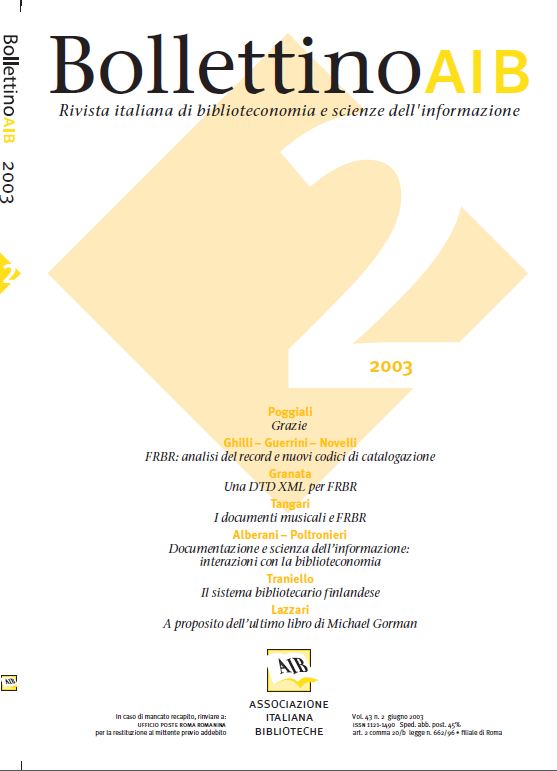Documentazione e scienza dell'informazione: interazioni con la biblioteconomia
Contenuto principale dell'articolo
Abstract
It is presented a brief review on the definition, evolution and development of three disciplinary areas in which librarians, documentalists and information scientists are deeply interested and involved. Starting from a survey by Jesse H. Shera published in 1968, which offers the state of art of these three closely related disciplines, the authors try to follow the further attempts to define them. They also try to identify, by tracking the literature, the changes occurred in the succeeding years, taking into due consideration also the discussions developed among Italian librarians and documentalists. The sections of the paper examine the nature of librarianship as a science and its interactions with documentation and information science together with the debates over the existence, evolution and development of these areas, which have changed substantially the information infrastructures and the profession.
The ideas and practices embraced by the term documentation, introduced by Paul Otlet and his colleagues to outline the activity of the International Institute of Bibliography, represent the key concepts of information science (databases, online access, links, hypertext/hypermedia systems, Internet, multimedia, substitutes for the book). The evolution of these concepts had to be closely linked to the technological innovations, to have the possibility, for instance, of new kinds of machines and procedures to assist intellectual work. In the history of documentation and information science Paul Otlet has been both a precursor and a founder, a precursor of V. Bush, D. C. Englebard and T. Nelson. His international perspective expands over a worldwide organization of information; he believed that worldwide interdependence reached by the humankind could not help but result in violence and disorder, unless a rational organization managed to turn interdependence into solidarity. The final considerations concern the need to adopt a theoretical structure which will comprise all types of communication. A new area of study - social epistemology - was introduced in library and information science by M. Egan and J. H. Shera. The nature and uses of social epistemology relate to epistemology and show an affinity for the sociology of knowledge. A study on the epistemological posture and a disciplinary specificity for the information science places it within a wider frame of "information and communication sciences". The diversity of the "wings", represented by the positions taken upon the specialists of these areas, comes to the conclusion that the relationships among these fields are very close and of mutual support rather than be in opposition, as they aim at solving problems of knowledge organization and transmission.
The ideas and practices embraced by the term documentation, introduced by Paul Otlet and his colleagues to outline the activity of the International Institute of Bibliography, represent the key concepts of information science (databases, online access, links, hypertext/hypermedia systems, Internet, multimedia, substitutes for the book). The evolution of these concepts had to be closely linked to the technological innovations, to have the possibility, for instance, of new kinds of machines and procedures to assist intellectual work. In the history of documentation and information science Paul Otlet has been both a precursor and a founder, a precursor of V. Bush, D. C. Englebard and T. Nelson. His international perspective expands over a worldwide organization of information; he believed that worldwide interdependence reached by the humankind could not help but result in violence and disorder, unless a rational organization managed to turn interdependence into solidarity. The final considerations concern the need to adopt a theoretical structure which will comprise all types of communication. A new area of study - social epistemology - was introduced in library and information science by M. Egan and J. H. Shera. The nature and uses of social epistemology relate to epistemology and show an affinity for the sociology of knowledge. A study on the epistemological posture and a disciplinary specificity for the information science places it within a wider frame of "information and communication sciences". The diversity of the "wings", represented by the positions taken upon the specialists of these areas, comes to the conclusion that the relationships among these fields are very close and of mutual support rather than be in opposition, as they aim at solving problems of knowledge organization and transmission.
Dettagli dell'articolo
Fascicolo
Sezione
Articoli

Questo lavoro è fornito con la licenza Creative Commons Attribuzione - Condividi allo stesso modo 4.0.
